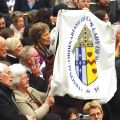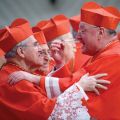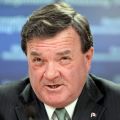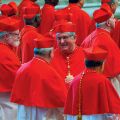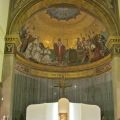When I became a Catholic several years ago I understood that I was joining a family. I knew what that meant intellectually, I understood it in theory, but I did not feel it in my bones — even though at the time I thought I did.
Now I feel it in my bones and in my heart, and the feeling will never escape me.
Like Elijah, I found God’s still voice but in a different way than the grand Old Testament prophet.
VATICAN CITY - In the days after the hoopla of the consistory for new cardinals left town, a smaller but more historic group of pilgrims was making its way to the tomb of the apostle Peter and the seat of his successor.
A pilgrimage of thanksgiving arrived from Britain — some 100 members of the Personal Ordinariate of Our Lady of Walsingham, the new “diocese” set up for former Anglicans who are now Catholics, but with the special task of preserving their Anglican cultural and liturgical patrimony. Some two years after Pope Benedict XVI made it possible with his document Anglicanorum Coetibus, the new structure is established in Britain and more recently also in the United States. The arrival of new Catholics from Britain, small in number but fervent in faith, was experienced as a “homecoming” by them, and a tiny step toward healing the breach of the divisions of the 16th century.
If it is possible for something to be shocking but not surprising then the so-called election robo-calls controversy fits the bill. Elections Canada has fielded 31,000 complaints from voters who say they were on the receiving end of telephone dirty tricks on or around federal election day last May.
The revelations are shocking because widespread deception may be expected in fledgling democracies or authoritarian states that masquerade as democracies, but surely not in a country like Canada. Then again, the allegations are not surprising because, sadly, Canadian politics have been travelling a slippery slope for many years when it comes to declining moral standards and ethical practices. Maybe we should have seen this coming.
VATICAN CITY - Consistories for new cardinals are usually held on major feasts, and the most recent one had a lesson for the liturgical life of parishes.
Blessed John Paul II held six of his nine consistories on Petrine feasts — three for Sts. Peter and Paul (June 29), two for the Chair of Peter (Feb. 22) and one for his silver jubilee as Successor of Peter in October 2003. Benedict held his first consistory in 2006 on the Feast of the Annunciation, and his next two on Christ the King in 2007 and 2010. This year he chose the Chair of Peter, the feast which highlights the role of Peter and his successors in authoritatively teaching the deposit of the faith.
On Feb. 17, the Supreme Court of Canada rendered its decision on a case that tested the right of parents to exempt their children from Quebec’s Ethics and Religious Culture (ERC) course. The case attracted many intervenors because the decision could impact other cases that question the lengths government can go to impose curriculum against parental wishes.
About one month earlier, the Ontario Catholic School Trustees’ Association released a report, “Respecting Difference,” which set guidelines for promoting equity and respect for all students in Catholic schools. It followed months of controversy surrounding “gay-straight alliances” in Ontario’s publicly funded schools. While there are differences between the two scenarios, both concern a provincial government trying to impose a school policy despite objections from parents.
Credit Air Canada with cluing me in to the bracing effects of the state sticking its imperious snout so deeply into Canadian society.
There I was on a recent cross-country flight waiting for someone in authority to give the malfunctioning in-flight entertainment system a good whack when the little screen was suddenly alight with visual metaphor. From the depths of one of the boundless bureaucracies that spend our quarter-trillion-dollar federal budget, we strapped in travellers were shown a videographic public service announcement on a matter so urgent it was deemed essential viewing for an audience that cannot escape.
Syrian President Bashar al-Assad is a despot whose shooting and shelling of his own people cannot be defended, yet he may be the last line of defence for Syria’s Catholics.
For that reason, Syrian Church leaders are taking a cautious approach to the nearly year-long rebellion to topple Assad. They have been pleading for calm, for dialogue and for Western assistance to find a peaceful solution to Syria’s popular uprising as the nation moves ever closer to all-out civil war. So far, the dispute is political, but churchmen fear the fighting may quickly turn religious.
In a time of high unemployment, jittery stock markets and worrying news about the European and American fiscal crises, many Canadians have been lowering their debt loads.
Their federal government is planning to do the same. Its challenge is to implement cuts without stalling a fragile recovery while also making the investments necessary to protect the next generation of Canadians.
ROME - Canada’s newest cardinal, resplendent in shimmering scarlet vestments, was still adjusting to his new look on Feb. 18 when he arrived at a reception in his honour. Barely two hours earlier he had become His Eminence Thomas Cardinal Collins after Pope Benedict XVI welcomed Toronto’s archbishop into the College of Cardinals on a sunny Saturday morning.
“These robes are very bright,” quipped Collins. “I’ll certainly stick out in a crowd.”
Cardinal Collins’ Irish roots come in handy for his titular parish in Rome
By Catholic Register EditorialROME - For the first time in its 100-year history, St. Patrick’s Irish National Church in Rome has a Cardinal Protector who is not Irish. But in Cardinal Thomas Collins the congregation figures it has been blessed with the next best thing.
“He has Irish roots,” said Fr. Tony Finn. “So there’s still an Irish connection. We’re delighted.”
When the Pope welcomes new members into the College of Cardinals they are made a titular pastor of a church in Rome. As such, they are entitled to vote in a papal conclave in keeping with the centuries-old tradition that the clergy of Rome elect the Bishop of Rome, the Pope. Collins learned that he was awarded St. Patrick’s a few days before the consistory but was sworn to secrecy until the Pope’s announcement.


